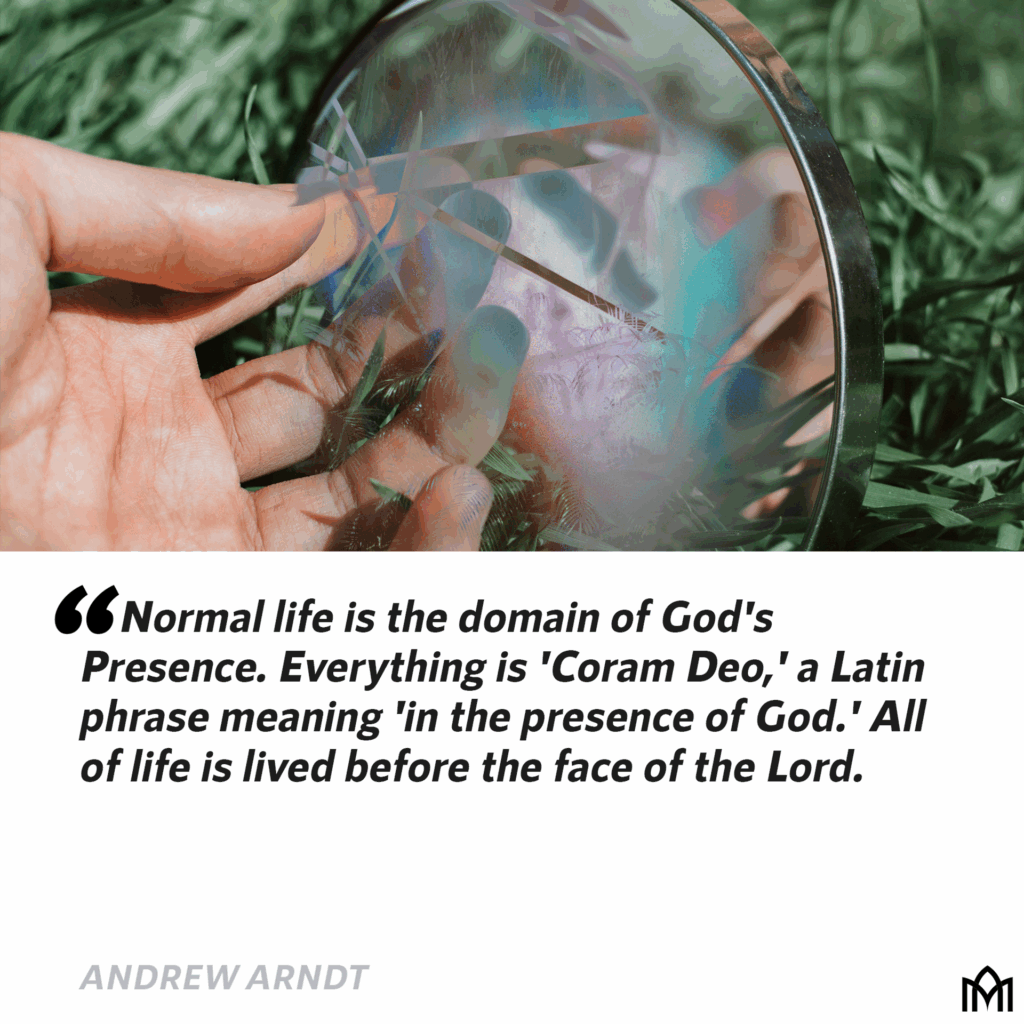My So-Called Ordinary Life
Normal life is the domain of God’s Presence, a long journey into the Great Tradition.
After the grand liturgical sweep that begins with Advent and culminates with the dramatic arrival of the Spirit on Pentecost Sunday, we enter what is known in the church calendar as “Ordinary Time.”
This–even in its nomenclature–will almost certainly feel like a letdown to us, unschooled by the Spirit as we are.
I tell people often that I am a “Great Tradition Charismatic.” The Great Tradition part has come lately for me–the last twenty-five or so years. The Charismatic part came first. It is my root.
A root I am deeply grateful for. The church I was born and raised in was a wild and wonderful non-denominational charismatic congregation at the edge of a small town in Wisconsin, started by a small group of folks who had found Jesus in the tent meetings of the Charismatic Renewal in the 60s and 70s and started meeting in the basement of a local Catholic church for prayer. The move of the Spirit first experienced in those tent meetings continued in that basement and before long, a church was born and blossomed into a vibrant ministry that reached tens of thousands of people across the state and region.
It’s been a quarter-century or so since I worshiped with the church of my upbringing, but the memories are still fresh, vivid. Rarely placid and never staid, the spiritual life of that community was ever and always marked by fervor–by a sense that God was real and the Spirit was at work and therefore anything could happen.
I’ve told people often over the years that, looking back, I think the single biggest gift my charismatic root gave and still gives to me is precisely that–the conviction that God is not an idea and that Christianity in its fundament and firmament is not a rehearsal of nice thoughts about God but real contact with a living God who, as Robert Jenson so memorably put it, can still surprise you.
We lived, therefore, at the edge of our seats, always expectant for new intrusions of divine grace. Miracles, healings, signs, wonders–we lived for it, for all of it. For earthquake, wind, and fire.
I do not and will never think that was wrong. Twenty-five years later, however, I am quite certain of this: it was not right enough. There is more to the story–and what was left out, whether by ignorance or design–was detrimental to me.
When I was nineteen I entered what I now recognize as a dark night of the soul. My first real awakening to personal faith had happened several years prior. The “explosion” of grace that moment represented carried me till I was nineteen–the fires of fervor burning hot and bright.
Until they didn’t. One day, the lights went out. Darkness descended–a midnight of the heart. Everything that had once been a source of consolation to me no longer brought me joy or meaning and all visible signs of God in my life suddenly vanished.
I groped in that darkness for years. No one had told me such things could happen. No one had given me a roadmap to navigate by faith the inky black of spiritual desolation. I had no idea what God was doing–if anything at all–and honestly wondered if something was wrong with me, if God was still with and for me, if he even loved me.
Christianity in its fundament and firmament is not a rehearsal of nice thoughts about God but real contact with a living God who, as Robert Jenson so memorably put it, can still surprise you. Share on X
There were two things that pulled me out. Both changed my life.
The first was the realization that my faith could be based on knowledge and not merely experience. I will never forget the morning in prayer I read Romans 5:8, “God showed his love for us in this: while we were yet sinners, Christ died for us,” and seeing for the first time that because God had done something in history that was objectively real and had a describable meaning, one could build their life on truth and not just feelings.
If that sounds wildly simplistic–forgive me. To this child of the charismatic movement, reared as I was on the priority of dramatic experience, that morning registered a 10 on the Richter Scale of Revelation. It was a thought I’d never thought before–and launched what has been a twenty-five-year journey into the Great Tradition, of coming to grips with the length and breadth and height and depth of the Mystery into which we have been plunged; the Mystery now revealed and entrusted to the saints as light for their and the world’s darkness.
Learning to make a home in the knowledge of God has grounded and stabilized me in ways too numerous to count. I still believe in the value of experience–even dramatic ones. I have them often. It’s just that I don’t depend on them anymore.
But there was a second thing–closely related to the first. During that time I began to see the value the Bible places on so-called normal life. Ironically, it took an experience to open my eyes to that.
Up early one morning during my junior year of college, my plan was to read the Bible and pray a bit and then head out on a run before cleaning up and going to class.
As I prayed, the Spirit descended in a way that was palpable. I could sense the Presence–and was so grateful for that, since only barely had the spiritual darkness begun to lift. But there it was–thick as a cloud. I gave my heart in worship and adoration and when the time was concluded I laced up my shoes and threw on some shorts and started the run.
Strangely, the sense of Presence continued. Trotting up 71st street in Tulsa on a dark and characteristically muggy Oklahoma morning, each footfall felt like an act of worship, like I was doing it with God. “When I run, I feel His pleasure.“1Chariots of Fire, 1981. It was something like that.
This surprised me. And what surprised me even more was that the sense of Presence continued through the rest of the morning routine. Showering, putting on clean clothes, making breakfast, stopping at the coffee shop, and marching up the sidewalk on the long trek from the commuter lot to the student center…it all felt graced.
I sat through economics class that morning in a state of bewilderment. To that point in my life, I had known the Presence in “spiritual” environments–wild worship services and dramatic encounters in prayer. But never in the warp and woof of the ordinary.
And yet–the Presence: as strongly felt there as I had felt it anywhere in my life. To be sure, the sense waned. (It’s hard to maintain a state of spiritual ecstasy through an economics class; let’s be honest.) But what lingered was this–yet another revelation: Normal life is the domain of the Presence.
And this revelation continued to linger, whether the Presence is “felt” or not. Sometimes, I think God must make a “thin place”2*Editorial Note: https://www.nytimes.com/2012/03/11/travel/thin-places-where-we-are-jolted-out-of-old-ways-of-seeing-the-world.html is a great piece on the nature of thin places. ~CK out of the ordinary stuff to remind us that there is no time and no place that is not already-always dignified by the great gift of his Presence. Everything is Coram Deo (A Latin phrase meaning “before the face of God” or “in the presence of God”). All of life is lived before the face of the Lord.
The experience opened my eyes to a dimension of biblical teaching I had never noticed–how the dream of God is no more and no less than to have a dwelling place with his people in this wonderful world he has made. “The man and his wife heard the sound of the Lord God as he walked in the garden in the cool of the day” (Genesis 3:8) says the writer of Genesis, in that characteristic biblical way, with anthropomorphisms that almost embarrass, what God has always been after–the communion of God and people in all the places we live and move and have our being.
Normal life is the domain of God's Presence. Everything is 'Coram Deo,' a Latin phrase meaning 'in the presence of God.' All of life is lived before the face of the Lord. Share on X
Israel’s law reflects this–down to its every, often tedious, jot and tittle. The tedium of it is precisely the point–the text’s way of teaching us that each aspect of human life is part of holiness, part of communion with God. We may scoff, for example, at the detailed instructions given on where and how the people are to relieve themselves, but when you get right down to it, the rationale given is surprisingly homey and down-to-earth: “For the LORD your God moves about in your camp to protect you and to deliver your enemies to you. Your camp must be holy, so that he will not see among you anything indecent and turn away from you” (Deuteronomy 23:14).
It’s basic manners, really. You’re hosting God. Cover up your you-know-what. Like you would do with anyone!
It’s about God-awareness. In the ordinary.
The trend continues into the New Testament. It always amazes me how Paul, for example, after painting what God has done for us in Christ with broad and brilliant brushstrokes streaked across the canvas of history, routinely turns to the quotidian for the fleshing out of the life of salvation.
- To the Household: Spouses loving each other; parents and children honoring each other; masters and slaves acting towards one another as unto Christ.
- To Life in the Body: Each member serving all the others; loving the least of these and welcoming the outcast; sharing resources and engaging in the hard, gritty work of forgiveness and reconciliation.
Again, we may scoff. Surely there are greater, better things for us to be doing. Surely the work of the Spirit exceeds our petty domesiticities.
Well, if the New Testament is any indication, I think we must say, “Yes, it does.” It is most certainly “more” than the quotidian. It is miracles and healings, signs and wonders, revelations and prophecies, dramatic moments and wild movements and a coming apocalypse that will transform the heavens and the earth in their deepest fathoms and furthest reaches.
More, yes. Much more.
But not less. Not less than what novelist Claire Keegan has called “small things like these.”
You see, it is not ‘either/or.’ It is ‘both/and.’
Ordinary Time, that long stretch from Pentecost to the beginning of another Advent, reminds us of this:
- It reminds us that God reveals himself both in the fire and earthquake on Sinai as well as in the sound of silence on Horeb;
- It calls to us both in the urgencies of the prophetic summons as well as in the leisure of green pastures;
- It tucks the Presence equally in the resurrection of the dead and the life of the world to come as he does in the small and undramatic tasks of living well–now in this age that is passing away.
There is no “this or that,” no “here and there” with our God–for he is the Lord of all things, all times, all places. Everywhere is holy ground.
As a pastor, the urgencies of our time concern me. So many of them feel hollow to me. Still, we are easily swept up in them. And while it is certainly true that there is such a thing as Spirit-inspired urgency (how difficult it is, though, to distinguish this from worldly urgency; God give us grace!), I also think that it is worth reminding ourselves as often as possible that there is such a thing as Spirit-inspired mundanity. This looks like:
- The holy tedium of washing clothes and paying bills and taking care of our kids or aging parents;
- Long conversations over good meals with friends and easy chats with neighbors on the sidewalk;
- Taking in a sunset on the porch or heading out on an easy evening walk with your dog on a much-beloved path.
These things, too, are God’s domain–just a few of the many tabernacles of Father, Son, and Holy Spirit (“How lovely thy tabernacles…” Psalm 84:1, KJV)–given to us for our pleasure, our enjoyment. Which is, after all, so much of the point of salvation: “to glorify God and enjoy him forever,” as per the Westminster Catechism.
Ordinary time teaches us this. It’s gift is that it teaches again and again to engage normal life in a spirit of gratitude, thanksgiving, and above all, attention to the Living God.
If the Westminster Catechism is true, Ordinary Time is nothing less than training for eternity.
R.S. Thomas is a good instructor here. In his poem, “The Moor,” he writes:
It was like a church to me.
I entered it on soft foot,
Breath held like a cap in the hand.
It was quiet.
What God was there made himself felt,
Not listened to, in clean colours
That brought a moistening of the eye,
In movement of the wind over grass.
There were no prayers said. But stillness
Of the heart’s passions — that was praise
Enough; and the mind’s cession
Of its kingdom. I walked on,
Simple and poor, while the air crumbled
And broke on me generously as bread.
May such stillness and cession and the broken bread of the ordinary be yours over the coming months.
Grace to you,
Andrew
///
There is such a thing as Spirit-inspired mundanity. This looks like the holy tedium of washing clothes, paying bills, taking care of our kids or aging parents, long conversations over good meals with friends and taking in a sunset. Share on X



